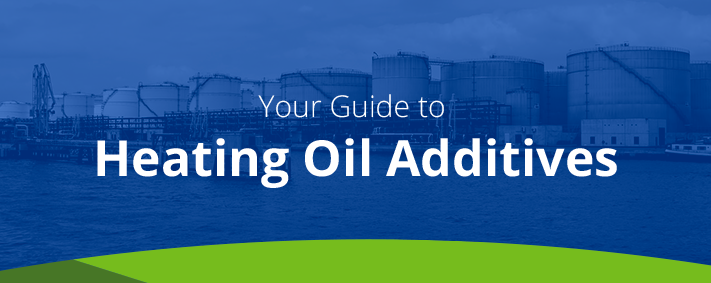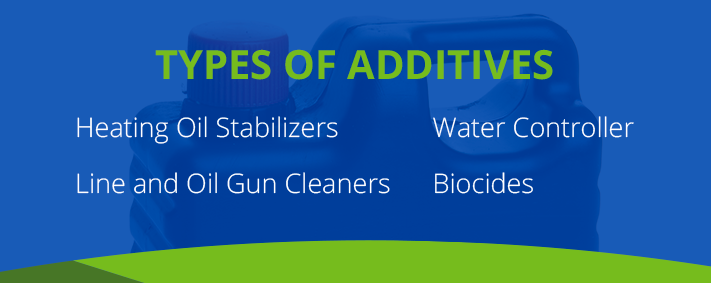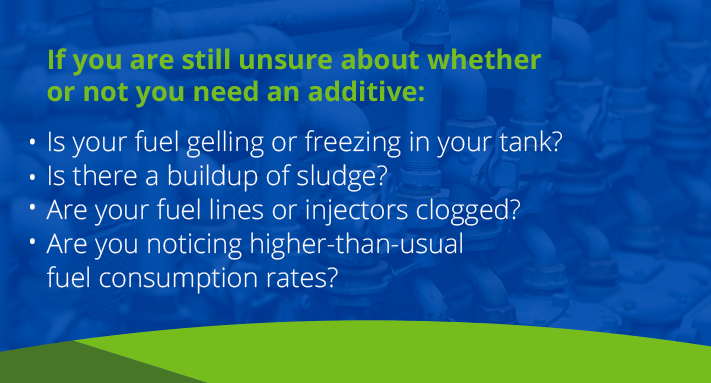Types of Heating Oil Additives:
As an oil tank owner, you may already have some awareness of heating oil additives. You may even have gotten into the habit of adding some to your tank, although you may not know just how those additives are improving the life of your tank.
As a homeowner, you rely on your oil tank to get you through whatever winter might have in store, and heating oil additives could be the secret weapon to winning the battle over winter. In this post, we will explore what heating oil additives are, why they are important and how each type can help improve the life of your tank.
- Types of Heating Oil Additives
- Why Do I Need to Use an Additive?
- How Do Additives Work?
- Will Additives Prolong the Life of My Tank?
- Common Tank Problems & Additive Solutions
- Pros & Cons of Heating Oil Additives
- When Should You Start Using Additives?
Types of Heating Oil Additives:

Listed below are a few different types of additives that are available for your home oil and the types of issues they are commonly used to treat:
- Water Controller - Controls any excess amount of water condensation within your tank.
- Line and Oil Gun Cleaners (Surfactants) - Cleans the fuel delivery line that carries oil from the tank to the burners as well as built-up sludge at the bottom of the tank over time.
- Heating Oil Stabilizers - Stabilizes fuel from outside environmental factors (may also include antioxidants).
- Biocides - Treats microbial growth in your tank
Heating oil additives are fuel oil additives (chemicals) that help improve the efficiency of your tank’s combustion.
When you add an additive to your fuel, you are changing some of your fuel’s alterable specifications like viscosity (the measurement of the thickness of your fuel) or flash point (the temperature needed to create a spark). These alterations help remove any innate fuel issues which lead to an increased efficiency from your fuel and your tank.
Why Do I Need to Use an Additive?
At this point, you may be asking yourself why you need an additive in the first place. After all, shouldn’t your fuel be able to do the job without having to add another component into the mix?
The fuel you use at home is refined from crude oil. Over the past few decades, the refining process of crude oil has changed to accommodate both environmental factors and the demand for low-sulfur diesel. The result is a less stable, high carbon residue #2 heating oil.
Fortunately, there have been a number of advancements made in the chemical make-ups of additives, specifically to address the change in fuel. These additives can help heighten some of your fuel’s characteristics altered during the refining process.

If you are still unsure about whether or not you need an additive, ask yourself these questions:
- Is your fuel gelling or freezing in your tank?
- Is there a buildup of sludge?
- Are your fuel lines or injectors clogged?
- Are you noticing higher-than-usual fuel consumption rates?
These are just a few of the signs that your fuel requires an additive. Of course, not all additives are created equal. One additive may solve your issue with sludge, but it may not be the answer for your gelled fuel. Before we dive into the right additives for each common issue, let us take a closer look at how an additive works when mixed in with your fuel.
How Do Additives Work?
There are 68 different fuel types that can be refined from crude oil. Once the refining process is complete, these different types all have their own specific characteristics, or specifications, that define them. As we previously mention, these characteristics are altered during the refining process. These alterations occur each time the finished product is engaged during a handling transition. Imported fuel can go through as many as seven handling transitions, whereas domestic fuel may go through as many as five.
With every transition, the fuel’s specifications alter, and these alterations end up equating to impurities in your fuel. Impurities can include things like water droplets (which can lead to bacteria growth), dirt, soot and other contaminants. All of this spells trouble for your tank, as more impurities in your fuel means less efficiency from your system.
This is where additives come in. Their job is to remove impurities from your fuel, helping to restore it as closely as possible to its original refined state. So how do they accomplish this?
First, additives have the ability to emulsify water droplets, which puts a stop to any bacteria growth. Second, their chemical makeup enables them to break down dirt or soot to a size that your tank’s filtration system can catch. Lastly, they have the ability to shrink and/or shatter contaminants, which can then in turn either burn off or drop down to bottom sludge.
Will Additives Prolong the Life of My Tank?
In short: yes, additives will prolong the life of your tank. Additives increase your fuel’s burning efficiency, so they are essentially removing the “heavy lifting” your tank would normally have to do in order to burn fuel that still had all its impurities.
The harder your tank has to work to churn out your home’s heat, the more wear and tear your system will go through. Additives help protect against issues connected with that wear and tear by removing impurities, which then allows your fuel to burn at a higher efficiency. The higher the combustion efficiency, the less your tank has to work to heat your home, and when your tank does not have to work as hard, it means fewer breakdowns and service calls.
Common Tank Problems & Additive Solutions
There’s no question that heating oil is popular among homeowners, especially those living in the Northeast. In fact, there are 10 million homes in the U.S. that use heating oil, and 350,000 were built in the last ten years.

With millions of homes out there relying on oil heat, there are bound to be some redundancies when it comes to common tank issues. Let us look at some of the most common issues homeowners and their oil tanks face, and how additives may resolve these problems:
Cleanliness: Built up carbon, varnish and/or other chemical components can clog your tank’s burner nozzle and pumps. In order for your tank to burn fuel, it needs to atomize the oil into a spray and your tank’s nozzle controls the pattern of this spray.
If the nozzle is clogged, it cannot effectively control the spray pattern, which means your tank is not burning your fuel as efficiently as it should be. Most heating oil additives contain a cleaning agent that can dissolve any carbon or chemical buildup, allowing your tank’s nozzle and pump to return to optimal efficiency.
Water: Water has a way of seeping into your tank even against your best efforts to fight it. The issue arises when there is an excess of water within your tank. This can lead to rusting of your tank’s internal components, bacteria growth and other negative impacts on your tank’s filtering system. Some additives emulsify the water, stopping its ability from growing bacteria that could clog your system, while others are able to eliminate a large quantity of the water from the system.
Gelling: The lower the temperature of your heating oil gets, the greater the chance your oil will gel. Usually this occurs when the temperatures begin to dip below 35 degrees Fahrenheit.
When gelling occurs, the oil is not able to flow as smoothly through the tank’s components, including the delivery line, nozzle and filter. Anti-gelling additives can help remove the threat of gelling by lowering the temperature that the oil will flow. This is especially helpful for those living in the Northeast, where winter temperatures are routinely below freezing.
Oxidation: When oxidation occurs within your fuel, it directly affects your tank’s ability to burn the fuel efficiently. That is because when oxygen mixes with other substances in your fuel, it destabilizes the fuel causing a breakdown that makes it less combustible.
In order to combat this, introduce an oxidation-reducing oil additive. This additive will slow down the oxidation process, allowing your fuel’s makeup to remain intact, and thus enabling it to burn at its optimal efficiency.
Sludge: As any tank owner would tell you, sludge is one of the more prominent problems an oil tank faces. Sludge is a buildup of dirt, rust and any microorganisms in your tank that sits at the bottom of it.
When your tank starts to get low on fuel, the built-up sludge is pulled into the supply line, causing the line and filters to clog. This affects your tank’s ability to produce heat, and in some cases can completely overwhelm your system. A sludge dissolver additive can help your heating oil to dissolve and reabsorb sludge, therefore allowing the system to actually burn the excess sludge.
Pros & Cons of Heating Oil Additives
Now that you know a little more about what heating oil additives are and how they work, you can better assess the pros and cons of adding a heating oil additive into your home’s system. Let us first look at the pros:
Prolonged Tank Life: Additives help prolong the life of your tank by eliminating factors that negatively affect your tank’s efficiency like rust, sludge and oxidation.
Removal of Excess Water: Excess water can cause bacterial growth this can clog your nozzle and filters. Rust is also possible, and it can degrade your tank’s interior components.
Minimize Gelling Issues: The right additive can lower the temperature of your oil, allowing it to flow past its pour point when temperatures begin to drop.
Removal of Sludge: Sludge can clog your supply line, your filters and other components of your tank. If left unattended for too long, it has the ability to cause a breakdown in your tank. An additive can help clean sludge up over time, with the potential to reabsorb and burn through the sludge.
While heating oil additives have some serious benefits, they also have their limits. Before you decide to introduce an additive into your system, make sure you also know about some of their shortcomings.
Let us look at some of the limits of additives:
Will Not Remove All Water: While excess water spells trouble for your system, no additive is going to be able to remove all of the water in your system. Be wary of any water-controlling additives that include alcohol. While alcohol will help remove the water, it has the potential to bring on a completely new set of issues. If your water-controlling additive is not able to remove enough excess water, you should place a call to your Smart Touch Energy technician.
Clogging May Occur: If you are using a line and oil gun cleaner or other surfactants to remove sludge, your tank’s filter may become clogged depending on the amount of sludge and/or debris that is being removed from the bottom of your tank.
No Single Cure-All Answer: There is not one specific product that will be able to solve all of your heating oil problems, although many additives are designed with the proper chemical makeup to handle more than one issue.
Keep in mind that regardless of what additive you decide to use, it should not replace any kind of regular tank maintenance you currently have in place.
When Should You Start Using Additives?
The best time to start using additives in your home oil is before a problem presents itself. After all, as the saying goes: A best defense is a good offense. No one wants to be without heat in the winter, so establishing what combination of additives to use and when is extremely important for the health and life of your tank.
Also, keep in mind that you should not only focus on your tank during the colder months. In fact, it is during the warmer months when your oils are dormant when more issues can arise concerning bacteria growth, sediment precipitation and carbon buildup.
If a problem does present itself, you should use an additive to stabilize your tank. Always consult a skilled technician with any questions as to what types of additives and the amounts to use if you are unsure of what will work best for your oil.
Choose Smart Touch Energy
Different situations and oil types call for different combinations and amounts of additives. From clogging to sludge to water condensation, the right type of additive is out there.All households are different. Even those that rely on fuel oil for heat can have widely varying service needs. Are additives just one question you have about your heating oil needs? Smart Touch Energy offers the following heating oil service options for your home oil heating system:
- One-Time Delivery
- Emergency Delivery Service
- Prime/Restart Service
At Smart Touch Energy, we help customers in New Jersey, New York, Massachusetts, Connecticut, Pennsylvania, Maryland, Rhode Island, New Hampshire, Maine and Delaware purchase energy products in a way that is easy, cost-efficient and convenient for them. Our website makes it simple for consumers to shop for their energy 24 hours a day, 7 days a week — just the way they like it and when.
At Smart Touch Energy, our mission is to create an easy, customer-centric buying experience for every energy consumer in America.




